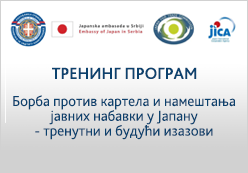 By participating at the inaugural meeting, the Commission for Protection of Competition has supported the start of operations of the Corporate Compliance Association. The Association gathers companies from various industries opened to further advance their related know-hows and more efficiently harmonize respective business operations against the current regulatory framework.
By participating at the inaugural meeting, the Commission for Protection of Competition has supported the start of operations of the Corporate Compliance Association. The Association gathers companies from various industries opened to further advance their related know-hows and more efficiently harmonize respective business operations against the current regulatory framework.
It is in the interest of the Commission to advocate and promote harmonization of business operations of undertakings against competition rules, since such conduct correspondingly reduces the risk of infringing competition which occurs, inter alia, also due to the fact that companies lack practices harmonized against competition rules and regulations, said Dr Miloje Obradović, President of the Commission for Protection of Competition, in its opening speech given at the inaugural meeting.
The compliance also affects the growth of business in full and complete conformity with competition rules, and likewise enables the internal identification of potential anticompetitive behaviors. Since the prevention of such adverse consequences is among the primary objectives of the Corporate Compliance Association, the Commission for Protection of Competition strongly supports its establishment and operations, underlined Dr Obradović.
Within the framework of the Association’s inaugural meeting, a panel discussion was held on “Why is corporate compliance important for each of us?”. The goal of this panel session, where Čedomir Radojčić, CPC Council member, has taken part as well, was to raise the level of awareness on the importance of this topic by defining the purpose and meaning of corporate compliance, but also to present concrete examples on its implementation in specific business operations of various undertakings.
 Representatives of undertakings involved in relevant corporate compliance-related activities also took an active role during the panel session, as well as representatives of the private and public sector, the Association of Serbian Banks and the University of Belgrade Faculty of Law.
Representatives of undertakings involved in relevant corporate compliance-related activities also took an active role during the panel session, as well as representatives of the private and public sector, the Association of Serbian Banks and the University of Belgrade Faculty of Law.









